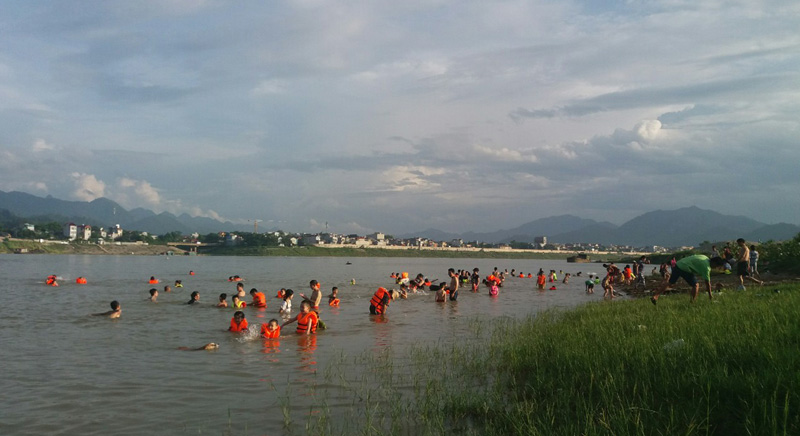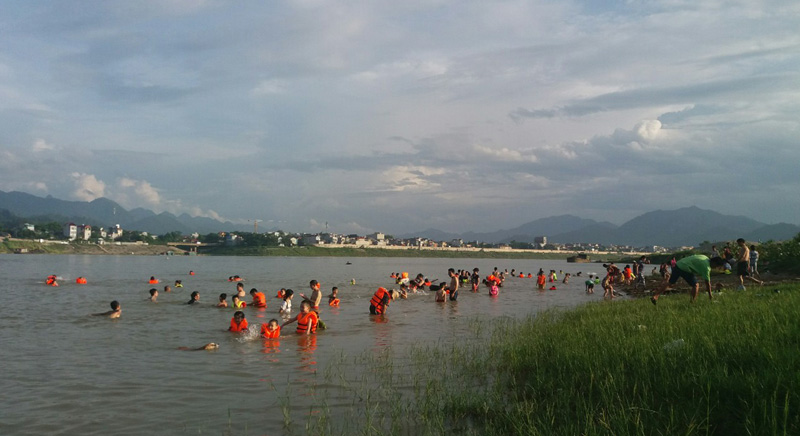
(HBO) - Hoa Binh is now one of the hottest spots in the north during a prolonging hot spell with temperature up to 40 degrees Celsius. People have their own ways to avoid heat and bathing in rivers, streams and swimming pools is a popular way to cool off the heat. However, not everyone knows that bathing in rivers, streams and swimming pools poses risk of diseases, and especially drowning that seriously threatens human health and life.

People should stay vigilant when bathing in rivers and streams
to protect their health and avoid the risk of drowning
Many people choose swimming pools for a bath
because they think it is safer. There are many options for those who prefer swimming
in the pool such as V'star swimming pool, managed by the provincial Department
of Culture, Sports and Tourism, one in TTN Center or some others at schools. On
these peak hot days, swimming pools are always overcrowding with hundreds of
swimmers. It is hard to see someone do warm-up exercise or bathe before going
to the pool. Normally, every person in the pool carries a lot of bacteria. The dirtier
the pool is, the higher risk of red sore eyes, diarrhea, dysentery and encephalitis
disease, thus hurting health of people, especially children.
Hoa Binh is home to many rivers,
lakes and streams. Many rural people are used to bathing in rivers and streams,
especially during the rainy season. Floods cause drowning that leaves many
deaths, mostly children. Statistics from the provincial Department of Labour,
Invalids and Social Affairs show that 39 children died of drowning last year.
In the first half of this year, there were seven drowning cases in four
districts, including one in Tan Lac, one in Da Bac, two in Lac Son and three in
Luong Son.
At present, most of the swimming spots in rivers
and streams crop up without warning signs and rescue personnel on duty so that a
little mistake could make swimmers drowned and dead./.
The emulation movement "Hoa Binh joining hands to build new-style rural areas” has been widely spreading, becoming a driving force that motivates the localities to renew rural landscapes and improve the material and spiritual lives of the residents. In this movement, the people play a central role-both as the main implementers and direct beneficiaries of its outcomes.
In response to the global digital revolution, Hoa Binh Newspaper is transforming itself into a modern and multi-platform media hub, blending cutting-edge technology with a restructured newsroom and a new generation of tech-savvy journalists.
Hoa Binh province’s Association of the Elderly recently held a conference to review the project on expanding the inter-generation self-help club model until 2025.
In a move to implement Resolution No. 57-NQ/TW, issued on December 22, 2024 by the Politburo, which targets breakthroughs in science-technology development, innovation, and digital transformation, the Hoa Binh provincial Department of Health has issued a plan to roll out the "Digital Literacy for All” campaign within the local health sector.
An Nghia Commune (Lạc Sơn District) is one of the communes that achieved the tha standard of the national new rural area in 2018. Entering a new development phase, the commune is now trying to meet the criteria for the advanced new rural development. With the strong political will and the public consensus, the commune is gradually overcoming the challenges to reach this goal, aiming for the sustainable development.



